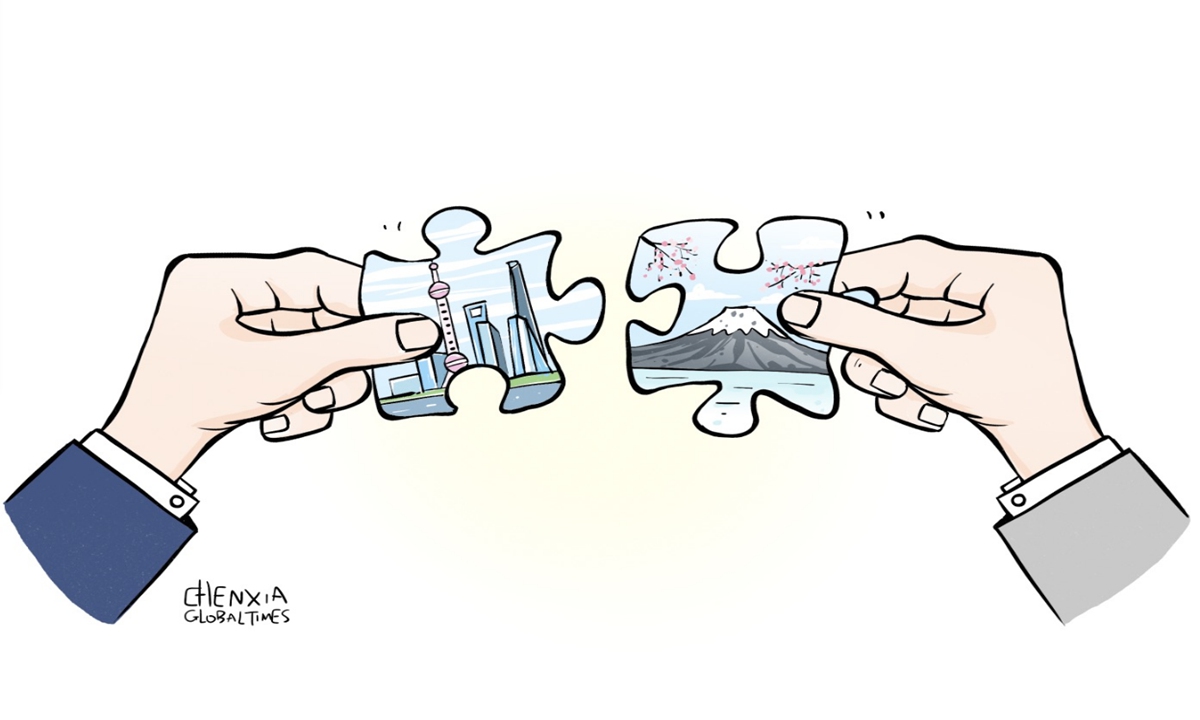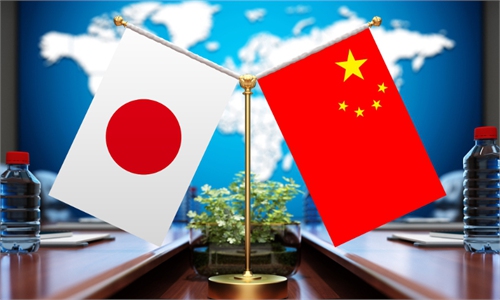Japanese economic delegation's China visit 'positive signal to bilateral relations:' observers

China Japan Illustration: Chen Xia/GT
A delegation of senior Japanese business leaders, led by the head of the Japan-China Economic Association (JCEA) Shindo Kosei, has been visiting China since Tuesday, the first such visit in four years.
Observers and industry insiders said on Wednesday that they expect the ongoing visit could lead to more common ground in bilateral cooperation, such as facilitating people-to-people exchanges and green-energy activities, while bringing more positivity to China-Japan relations, which have hit a number of geopolitical setbacks in recent months.
The delegation, which is scheduled to stay through Friday, will discuss a wide range of economic issues with the Chinese side.
About 200 people are participating in the trip to China, including Masakazu Tokura, chairman of the Japan Business Federation and Ken Kobayashi, chairman of the Japan Chamber of Commerce and Industry, the Japan News reported on Wednesday.
"It marks the 46th time that a Japanese business delegation visited China since 1975…We hope that through exchange and dialogue with the Chinese side, the two countries could rebuild a trustworthy and friendly cooperation environment, and develop complementary, mutual learning and improving cooperation mechanisms," the JCEA said in a statement sent to the Global Times.
China and Japan are Asian neighbors and the second- and third-largest economies in the world. Under the current international situation, "it is of increasing necessity for the two countries to strengthen cooperation based on a spirit of mutual trust," the association added.
The delegation's composition is of substantial scale, which underscores the significant importance that the Japanese business community attaches to China-Japan economic relations, Xiang Haoyu, a research fellow at the China Institute of International Studies, told the Global Times on Wednesday.
The visit is widely seen as sending a positive signal for bilateral economic relations, and it also mirrors the desire of the Japanese business community to maintain dialogue with China and expand cooperation, especially at a time when Japan's economy is struggling with a lack of indigenous drive, and as bilateral trade and investment slowed or fell last year, observers said.
China is Japan's largest trading partner and one of the top investment destinations for Japanese companies. In 2023, China's exports to Japan dropped 8.4 percent year-on-year, while imports from Japan declined 12.9 percent, customs data showed.
It is not in the interests of the majority of the Japanese business community to impose trade curbs on shipments to China, Chen Zilei, director of the Research Center for Japanese Economics at the Shanghai University of International Business and Economics, told the Global Times on Wednesday.
China-Japan relations have been overshadowed by China-US relations. The Fumio Kishida government has for some time followed the US strategy of containing China, such as by restricting exports of advanced chipmaking equipment to China in 2023.
Ahead of the visit, Ren Hongbin, chairman of the China Council for the Promotion of International Trade, met with Japanese Ambassador to China Kenji Kanasugi in Beijing on Monday, during which they conducted in-depth communication on topics involving facilitating pragmatic cooperation between Chinese and Japanese businesses, as well as the World Expo 2025 in Osaka.
Chen expected that the Japanese side could discuss opening more direct flights and creating more convenience for business exchanges, as well as expanding areas of cooperation, as economic ties between the two countries remain complementary.
But Chen also stressed that other requests of the Japanese side should be made on the basis of "respecting the national security of China and the safety and health of Chinese citizens."
According to a report by the Nikkei, the delegation could also express the hope for the Chinese authorities to lift the ban on seafood imports from Japan, following the latter's dumping of nuclear-contaminated wastewater into the ocean.
It is also hoped that the deepening of bilateral economic ties would create a positive environment and conditions for easing and stabilization in China-Japan relations, observers said.
According to a survey recently released by the Global Times Institute, nearly 60 percent of respondents from 19 countries, including Japan, expressed the desire for their countries to have closer and friendlier relations with China.


